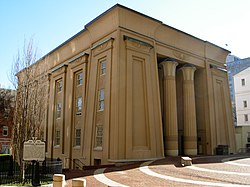Egyptian Building
|
Egyptian Building
|
|

Front view of the Egyptian Building
|
|
| Location | Richmond, Virginia |
|---|---|
| Coordinates | 37°32′25″N 77°25′45″W / 37.54028°N 77.42917°WCoordinates: 37°32′25″N 77°25′45″W / 37.54028°N 77.42917°W |
| Built | 1845 |
| Architect | Thomas Stewart |
| Architectural style | Egyptian Revival |
| NRHP Reference # | 69000321 |
| VLR # | 127-0087 |
| Significant dates | |
| Added to NRHP | April 16, 1969 |
| Designated NHL | November 11, 1971 |
| Designated VLR | November 5, 1968 |
The Egyptian Building is a historic college building in Richmond, Virginia, completed in 1845. It was the first permanent home of the Medical Department of Hampden-Sydney College (later renamed the Medical College of Virginia) and now is a part of Virginia Commonwealth University. It is considered by architectural scholars to be one of the finest surviving Egyptian Revival-style buildings in the nation. The Egyptian Building was added to the Virginia Landmarks Register on November 5, 1968, the National Register of Historic Places on April 16, 1969, and finally designated as a National Historic Landmark on November 11, 1971.
After several years in the Union Hotel, the board of the college decided they needed a space specifically created for medical education. Aid was sought to pay for the structure and the Commonwealth offered a twenty-five thousand dollar loan and Richmond donated two thousand dollars. The board chose the noted Philadelphia architect, Thomas Somerville Stewart, who had just completed the new St. Paul's Church, to build the College Building. Stewart chose to design the new building in the Egyptian Revival mode, considered to be an exotic style. His choice of this style was considered to be appropriate by the board because it was considered that the origins of medicine went back to the Egyptian physician, Imhotep. Sir William Osler wrote that Imhotep was the "first figure of a physician to stand out clearly from the mists of antiquity."
The Egyptian Building was originally called College Building, and later the Old College Building. The National Register of Historic Places considers it to be the oldest medical college building in the South. The battered corners of the walls of the structure recall the ancient temples of Egypt.
...
Wikipedia


